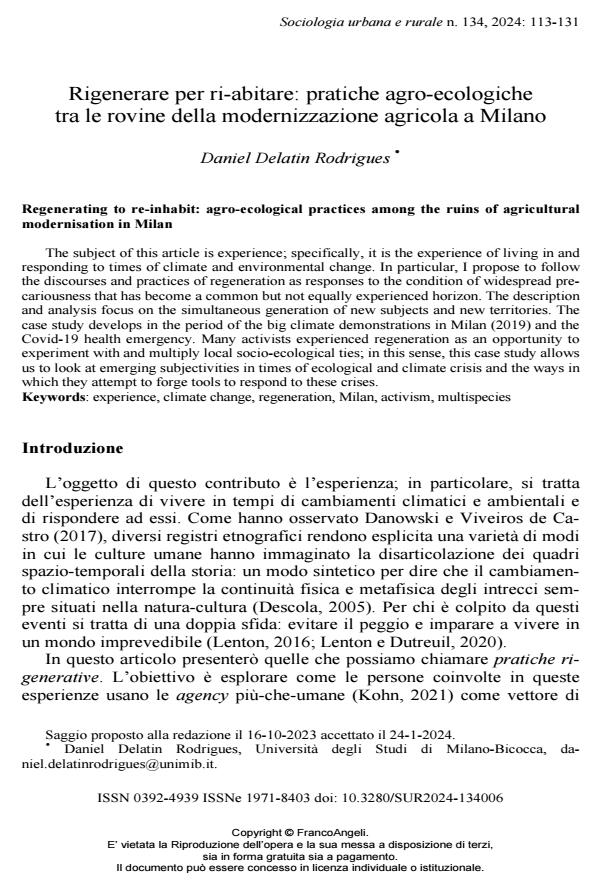Rigenerare per ri-abitare: pratiche agro-ecologiche tra le rovine della modernizzazione agricola a Milano
Titolo Rivista SOCIOLOGIA URBANA E RURALE
Autori/Curatori Daniel Delatin Rodrigues
Anno di pubblicazione 2024 Fascicolo 2024/134
Lingua Italiano Numero pagine 19 P. 113-131 Dimensione file 256 KB
DOI 10.3280/SUR2024-134006
Il DOI è il codice a barre della proprietà intellettuale: per saperne di più
clicca qui
Qui sotto puoi vedere in anteprima la prima pagina di questo articolo.
Se questo articolo ti interessa, lo puoi acquistare (e scaricare in formato pdf) seguendo le facili indicazioni per acquistare il download credit. Acquista Download Credits per scaricare questo Articolo in formato PDF

FrancoAngeli è membro della Publishers International Linking Association, Inc (PILA)associazione indipendente e non profit per facilitare (attraverso i servizi tecnologici implementati da CrossRef.org) l’accesso degli studiosi ai contenuti digitali nelle pubblicazioni professionali e scientifiche
L’oggetto di questo articolo è l’esperienza; nello specifico, l’esperienza di vivere e rispondere ai tempi del cambiamento climatico e ambientale. In particolare, propongo di seguire i discorsi e le pratiche di rigenerazione come risposte alla condizione di precarietà diffusa che è diventata un’ori-ginanza comune ma non ugualmente vissuta. La descrizione e l’analisi si concentrano sulla generazione simultanea di nuovi soggetti e nuovi territori. Il caso di studio si sviluppa nel periodo delle grandi manifestazioni per il clima a Milano (2019) e dell’emergenza sanitaria Covid-19. Molti attivisti hanno vissuto la rigenerazione come un’opportunità per sperimentare e moltiplicare i legami socio-ecologici locali; in questo senso, questo caso studio ci permette di guardare alle soggettività emergenti in tempi di crisi ecologica e climatica e ai modi in cui cercano di forgiare strumenti per rispondere a queste crisi.
Parole chiave:experience, cambiamenti climatici, rigenerazione, Milano, attivismo, multispecie.
Daniel Delatin Rodrigues, Rigenerare per ri-abitare: pratiche agro-ecologiche tra le rovine della modernizzazione agricola a Milano in "SOCIOLOGIA URBANA E RURALE" 134/2024, pp 113-131, DOI: 10.3280/SUR2024-134006